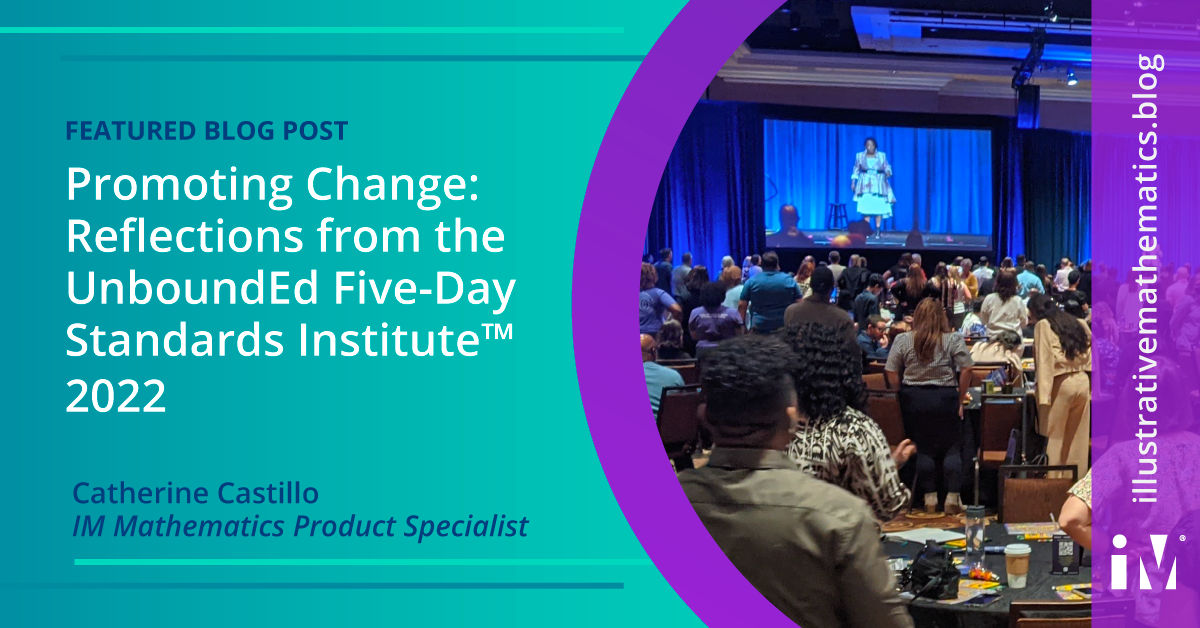By Catherine Castillo, IM Mathematics Product Specialist
In her book Culturally Responsive Teaching and the Brain, Zaretta Hammond states,
“Engaging in reflection helps culturally responsive teachers recognize the beliefs, behaviors, and practices that get in the way of their ability to respond constructively and positively to students.”

I had the opportunity to attend the UnboundEd Standards Institute in Orlando this summer with some IM colleagues. We were greeted with pom poms and cheers as we entered the first keynote and the energy remained high all week, powered by educators who came to learn how to do better for kids and by facilitators and speakers who emanated passion for creating systemic change that affirms and empowers all students.
At the Standards Institute, we dug into the standards. We discussed focus, coherence, and rigor and evaluated each by looking at the IM K–12 Math™ curriculum. However, this work was not just focused on standards alignment, there was a deeper “why” to this work. For me, this energy powered me through a week of work and reflection.
We had explicit conversations about the amount of below-grade-level work that is given to students and the implications this has for marginalized students. We read the shocking studies about the mathematical achievement gap, particularly for Black and Brown students. Many of us have seen this play out in our own contexts. In reflection, we recognized how our systems can perpetuate these inequities by tracking students into ability groups and low-level classes rather than acting on the belief that all students are capable of high levels of learning.
As a facilitator said, “Is it really an achievement gap if students haven’t been given the opportunity to engage with grade-level materials? No! It’s a provision gap.” We reflected on how differentiation has been twisted and pulled into a belief that not all students are capable of rigor and must be given work on “their level.” It is a belief that students must master the basics before engaging in cognitively demanding work. When we focus on our students’ deficits, we set them up to fail. However, when we start with our students’ assets and strengths, we see an opportunity to connect students’ experiences and knowledge to the work of others. As expert teachers, we use our craft to pose questions to move their thinking forward, and give students the opportunity to engage in the mathematical practices.
This focus on asset-based language, similarly as in our IM Certified Professional Learning, permeated everything we discussed. One activity involved participants brainstorming words or phrases we have heard that use deficit-based language. We were then challenged to reframe that language in an asset-based way. We dug into our personal biases and discussed how an asset-based lens can affirm students’ identities. As educators, we know that our power to support students lies in our connections to each other and our constant challenge of inequitable practices. UnboundEd Standards Institute created those collaborative spaces for us to join together and do the work.
It is past time that the conversation around student achievement in mathematics be addressed as an opportunity gap in access to grade-level mathematics. It is evident that UnboundEd’s mission puts access to grade-level work at the forefront, just as we do at Illustrative Mathematics. By digging into Illustrative Mathematics tasks, participants were able to envision what grade-level work that honors student knowledge and experiences looks like. We were given time to engage in conversations about how the structure of the IM curriculum and the elements of universal design support teachers in enacting classroom instruction that meets the needs of all learners. Maybe most importantly, we were given time to reflect on enactment: how the decisions we make as educators and the instructional practices we employ either foster or inhibit learning environments in which all students are engaged in meaningful mathematics.
When thinking about potential curricula for adoption, we should consider these dilemmas:
- How will this curriculum allow all students to engage in grade-level work?
- How does the curriculum allow students to see and feel themselves as active sense makers and mathematicians?
- What does rigor really mean? Is it evident in the curriculum materials?
- Is attention paid to student mathematical identity and culturally relevant tasks?
- How does this curriculum allow teachers to engage in mathematical teaching practices?
- How might the curriculum support collaborative spaces between students and between educators?
In my role as a product specialist at IM, I regularly engage with districts who are going through the same process. I am often asked, “What can we do to get ready?” “How do we begin shifting our mindsets to implement a student centered curriculum like IM?” There are many resources I have called upon in the past when faced with the same questions, but the UnboundEd Standards Institute is now at the top of my list. The possibilities I saw and felt while entire districts engaged in this learning together was inspiring!
Next Steps
As a new school year begins, reflection is key to continuing our journey. We strive to create inclusive and productive environments for students, where students are able to take risks. We are responsible for providing students with challenging, grade-level instruction. Relationships and trust are at the foundation of this work
What do we need to be aware of and what changes do we need to make to our practice to ensure students see themselves in the curriculum and feel empowered to engage with others in active problem solving?
